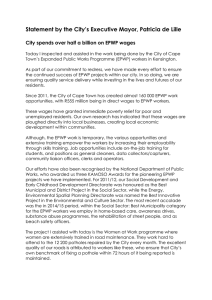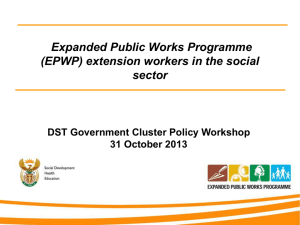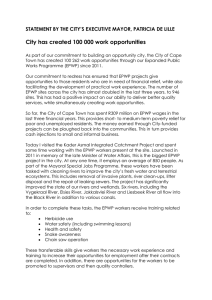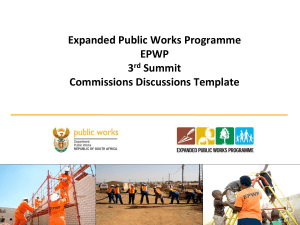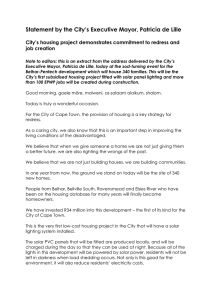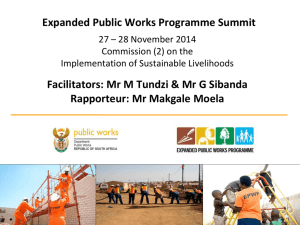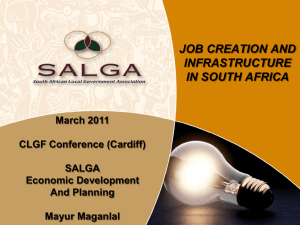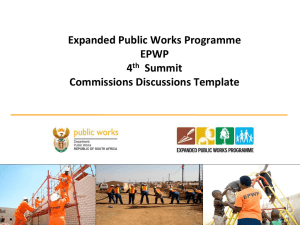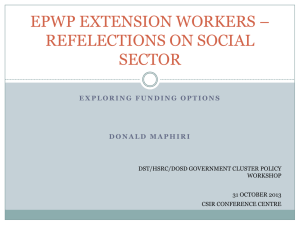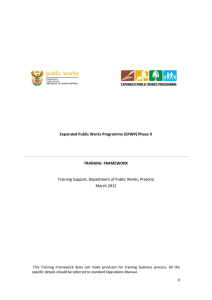Speech by the Executive Mayor of Cape Town,
advertisement
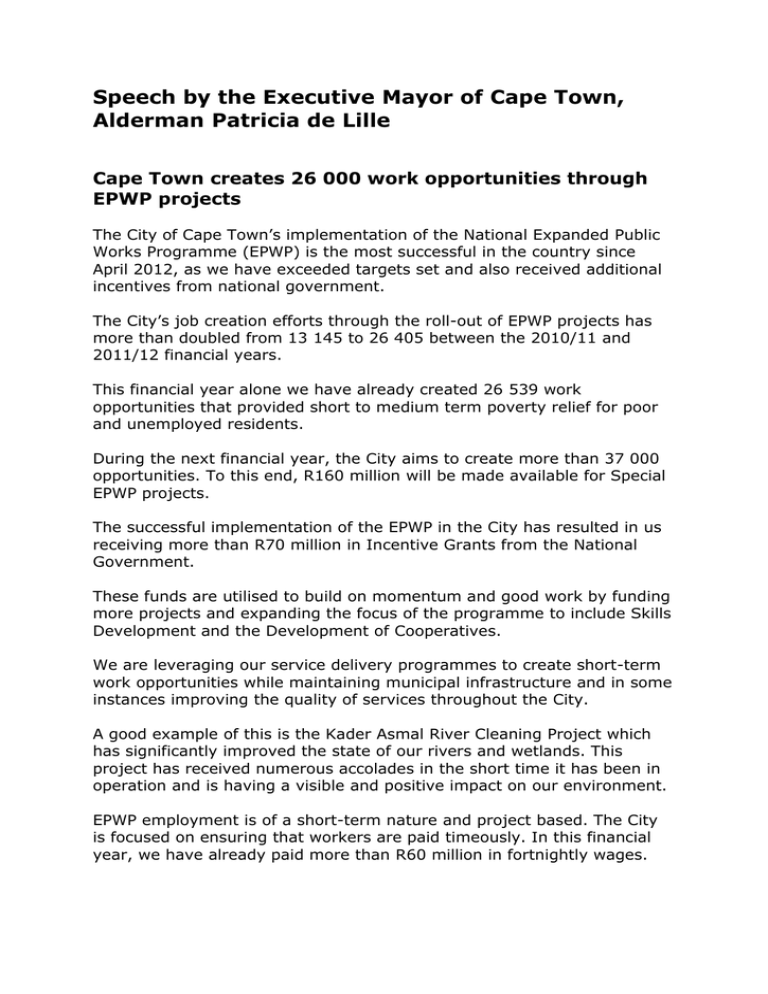
Speech by the Executive Mayor of Cape Town, Alderman Patricia de Lille Cape Town creates 26 000 work opportunities through EPWP projects The City of Cape Town’s implementation of the National Expanded Public Works Programme (EPWP) is the most successful in the country since April 2012, as we have exceeded targets set and also received additional incentives from national government. The City’s job creation efforts through the roll-out of EPWP projects has more than doubled from 13 145 to 26 405 between the 2010/11 and 2011/12 financial years. This financial year alone we have already created 26 539 work opportunities that provided short to medium term poverty relief for poor and unemployed residents. During the next financial year, the City aims to create more than 37 000 opportunities. To this end, R160 million will be made available for Special EPWP projects. The successful implementation of the EPWP in the City has resulted in us receiving more than R70 million in Incentive Grants from the National Government. These funds are utilised to build on momentum and good work by funding more projects and expanding the focus of the programme to include Skills Development and the Development of Cooperatives. We are leveraging our service delivery programmes to create short-term work opportunities while maintaining municipal infrastructure and in some instances improving the quality of services throughout the City. A good example of this is the Kader Asmal River Cleaning Project which has significantly improved the state of our rivers and wetlands. This project has received numerous accolades in the short time it has been in operation and is having a visible and positive impact on our environment. EPWP employment is of a short-term nature and project based. The City is focused on ensuring that workers are paid timeously. In this financial year, we have already paid more than R60 million in fortnightly wages. This is a significant contribution to the economy of our City. An impact study conducted by the City to measure the economic advantage of the EPWP programme shows that it is a meaningful contributor to current household incomes of special group beneficiaries, namely: unemployed, youth, women and people living with disabilities. The economic benefit was notably positive in many households where the EPWP wages was the only source of income. The beneficiaries expressed the fact that their short-term employment contributed to their family’s immediate needs as well as offered a good learning experience. Workers revealed that income from EPWP wages are used to buy basic necessities such as food, electricity and clothing as well as to pay school fees and repay outstanding debts. We know that the poor often obtain necessities from micro and small enterprises within their neighbourhood. Feedback from some of these businesses recognised an improvement in turnover since the increase in EPWP projects. The City’s EPWP projects have contributed significantly towards increased service delivery, primarily in areas such as Social Development, Health, Safety and Security, Human Settlements and Utility Services. In our Social Development Directorate, we have created more than 500 opportunities involving street people. Projects undertaken include the cleaning of cemeteries and Kramats. In the City’s Health Directorate, three EPWP workers are employed at each of the 100 City clinics across the metro to assist with clerical tasks in the record rooms. This reduces the lengthy queues in the waiting room and the turn-around time for patients requiring medical attention. In our Safety and Security Directorate, we are employing disabled fire-station watch room attendants: This project was initiated to provide opportunities for disabled persons within a suitable environment. The group of 10 (six women and four men) are located across various fire stations in the City and operate the electronic switchboard console, receive and route telephone calls. These calls are logged, prioritized and sent to the Officer on Duty. In our Human Settlements Directorate, we have provided work opportunities with projects which range from developing a team of 80 semi-skilled workers to assist the City’s full-time plumbers, carpenters, painters and engineers. These workers are provided with skills that will equip them for the job market. The re-blocking project in Milnerton created 45 opportunities and allows for the dismantling and realignment of informal structures. This results in improved safety and healthy living conditions for residents and easier access for emergency services in the event of an emergency. The Green Grow project is Elsies River has started a vegetable garden over two hectares of public open space and supplies vegetables to 800 residents. More than 60 opportunities were already created and we are planning to replicate this success story to other areas in the City. Sometimes a project may require minimal skill but has a distinctive social advantage, like the graffiti removal project which employs 100 EPWP workers across the city to remove graffiti in the community they serve. We believe that the success of these projects and the many other initiatives currently in progress contribute to ensuring work opportunities that are meaningful and will result in increase in the standard of service delivery. Unemployed persons interested in work through the EPWP can register at their local Subcouncil to get onto the City’s Jobseekers Database. Workers are recruited from the database on a random basis and are notified via telephone of a possible opportunity to be employed. It is therefore very important for jobseekers to update their records regularly at their local Subcouncil where they had originally registered or to re-register in another Subcouncil if they have relocated to another area in the City. Employment at Subcouncil or ward level improves safety and trust in communities as the temporary workforce is selected from that area. There is currently an unfortunately high drop-out rate on projects and we encourage workers from the community to stay with the project so that they may acquire the necessary skills and improve their future. It is our vision to grow the EPWP program beyond the national government funding model by engaging in public-private partnerships as part of our Social Development and Economic Growth Strategies. The development of a training framework as a subset to the City’s EPWP business plan will form part of the City’s strategic focus area of an Opportunity City. Here we aim to create a systemic link that is essential with all three spheres of government to leverage existing structures which will support the City’s training framework in the medium to long term. One such initiative will be rolled out in partnership with a local NGO and the Dutch Government where we will provide accredited training to EPWP workers in artisan skills such as Plumbing, Carpentry and Plastering.
